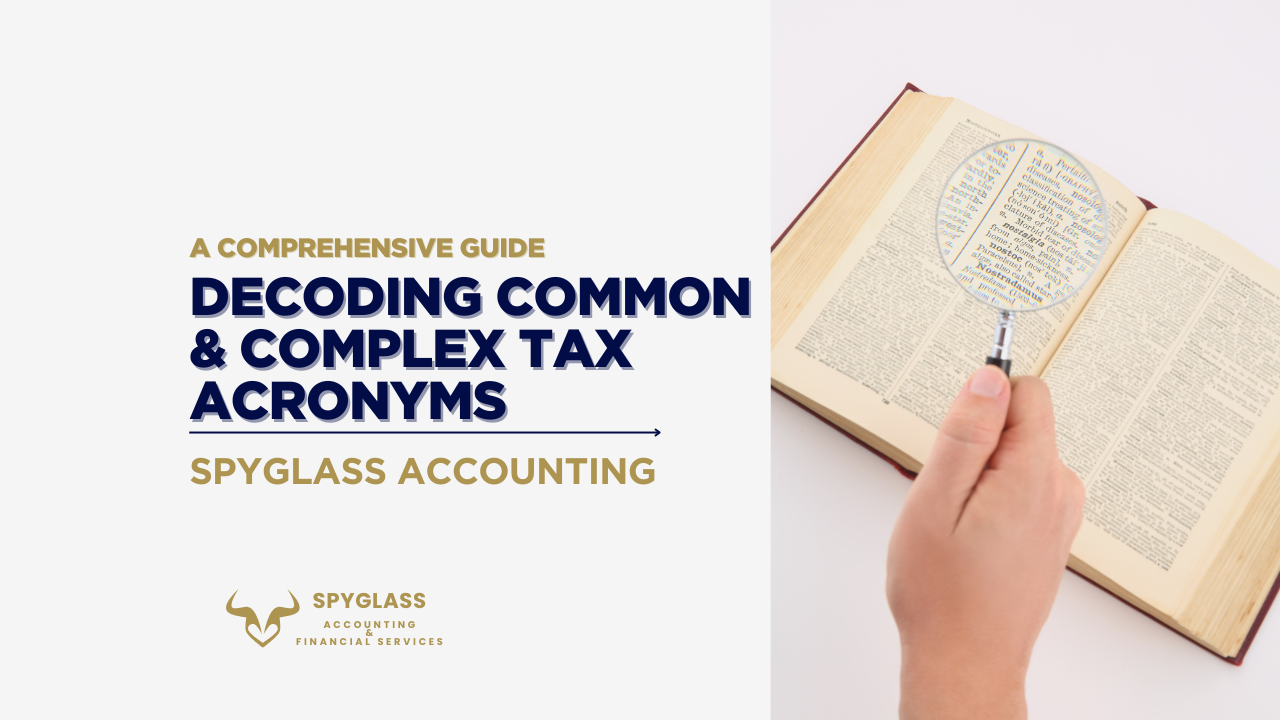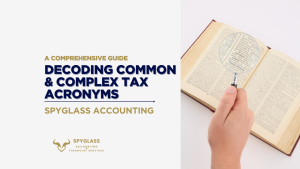
Decoding Common and Complex Tax Acronyms: A Comprehensive Guide
Navigating the labyrinth of tax terminology can be daunting. From AGI to OIC, the U.S. tax code is replete with tax acronyms that can perplex even seasoned taxpayers. At Spyglass Accounting and Financial Services, we aim to demystify these terms, empowering you to make informed financial decisions.

Understanding Key Tax Acronyms
- AGI – Adjusted Gross Income
Your AGI is your total gross income minus specific deductions, such as student loan interest, retirement contributions, and alimony payments. It’s a pivotal figure, influencing eligibility for various tax credits and deductions.
- AMT – Alternative Minimum Tax
The AMT ensures that high-income earners pay a minimum amount of tax, regardless of deductions and credits. It operates parallel to the regular tax system, requiring taxpayers to calculate their liability under both systems and pay the higher amount.
- EIN – Employer Identification Number
An EIN is a unique nine-digit number assigned to businesses for tax identification purposes. It’s essential for filing business taxes, opening bank accounts, and hiring employees.
- EITC – Earned Income Tax Credit
The EITC is a refundable credit for low- to moderate-income workers, particularly those with children. The credit amount varies based on income and number of qualifying children.

- FSA – Flexible Spending Account
An FSA allows employees to contribute pre-tax dollars for qualified medical expenses. Funds must be used within the plan year, or they may be forfeited.
- HSA – Health Savings Account
HSAs are tax-advantaged accounts for individuals with high-deductible health plans. Contributions are tax-deductible, and withdrawals for qualified medical expenses are tax-free.
- IRA – Individual Retirement Account
IRAs are savings accounts with tax advantages for retirement savings. Traditional IRAs offer tax-deferred growth, while Roth IRAs provide tax-free withdrawals in retirement.
- MSA – Medical Savings Account
MSAs are similar to HSAs but are limited to self-employed individuals or employees of small businesses. They offer tax-deductible contributions and tax-free withdrawals for medical expenses.
- MFJ – Married Filing Jointly
MFJ filing status is for married couples who combine their income and deductions on one tax return, often resulting in a lower tax liability.
- MFS – Married Filing Separately
Married individuals may choose to file separately MFS , which can be beneficial in certain situations, such as when one spouse has significant medical expenses.

- SIMPLE – Savings Incentive Match Plan for Employees
SIMPLE IRAs are retirement plans for small businesses, allowing employees and employers to contribute to traditional IRAs.
- OIC – Offer in Compromise
An OIC is an agreement between a taxpayer and the IRS to settle a tax debt for less than the full amount owed, often used when paying the full debt would cause financial hardship.
Conclusion
Understanding these tax acronyms is crucial for effective financial planning and compliance. At Spyglass Accounting and Financial Services, we’re committed to guiding you through the complexities of the tax system. For more insights, explore our other resources:
- Sports Betting Taxes: Do I Have to Claim My Winnings?
- Navigating Tax Deductions for Small Businesses

Note: This blog is for informational purposes only and does not constitute legal or tax advice. For personalized assistance, please consult a tax professional.